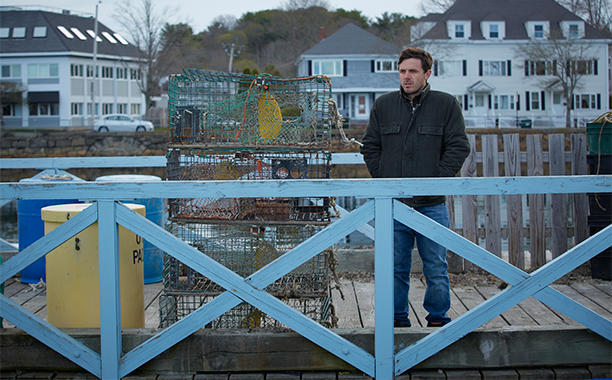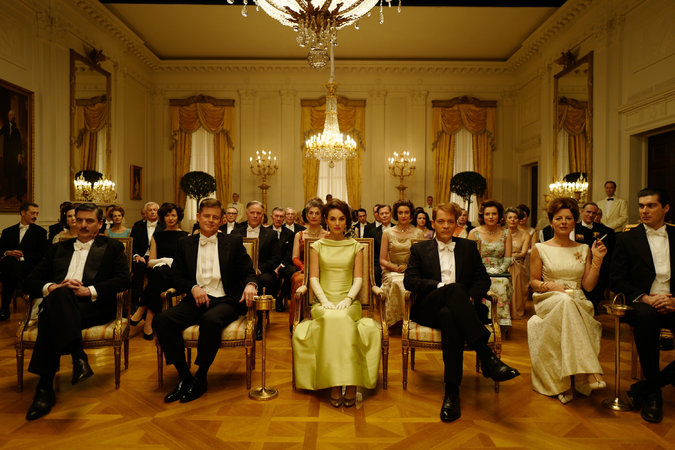Alex writes about the differing looks at the main characters’ lives in Manchester by the Sea and Jackie.
Today, while sitting in a theatre for a Tuesday afternoon screening of Manchester by the Sea, the lone brunette in a room full of white-haired octogenarians, the film faded out as its final scene came to a muted close. Two people sit perched on the edge of a boat, silently fishing before the picture slowly transitions to a black screen.
“That’s it?” one of the surrounding elders murmured.
“I guess,” said her companion.
That was, indeed, it. There was no rousing finale to send us flying into the streets of Toronto with a newfound sense of exuberance. This movie just kind of ended.
The film Jackie is an equally excellent film that delivers more of a sense of closure, albeit one that is built on a precise and well-constructed lie. We see Jackie Kennedy with her still-alive husband dancing in the White House, a picture of love and opulent happiness. It is only as viewers of the whole film up to this point that we are able to see this picture painted with doubtful, lonely hues of blue.
When I initially saw Manchester by the Sea a couple of weeks ago, I loved it. (I still do.) When I initially saw Jackie last Friday, I loved it. (I still do.) Over the weekend, thinking about Jackie while trying – and mostly failing – to eloquently explain its greatness to a fellow drunkard at a bar I didn’t particularly care to be at, I realized what I loved about it were the same things I loved about Manchester by the Sea. Seeing them back to back today only cemented what I had become sure of in the interim.
There’s an odd moment of musical selection that occurs at the midpoint of Manchester by the Sea, a moment I wasn’t initially sure I was accepting of. As the film’s most tragic moment plays out, a grand, overly dramatic piece of music plays (it is from Handel’s Messiah). Houses burn, parents cry, the aforementioned surrounding octogenarians gasp, and even John Williams wonders whether or not this choice of music isn’t a little too big for its setting. As the scene continues, as the music continues, everything escalates until our main character fails to commit suicide due to his lack of firearms knowledge. Lee Chandler is tackled, the gun is removed from his hand, and we snap back to the present. The music faded away, even though it was immediately clear Lee’s memory of the moment never would.
But then, some sixty-three minutes later, the movie ended and the quiet landing reframed everything that came before it, as so much of the movie had. When Lee finds out his brother Joe has passed away in the opening scenes of the film, Lee’s lack of emotion is initially confusing. As we learn the moment that came years before it, we start to understand why Lee is so emotionally blunted: when you are (drunkenly and accidentally) responsible for the death of your three children, your brother’s congenital heart failure is a relative zero on the familial tragedy scale. Each memory that we see in Manchester by the Sea reframes what we had seen before it, but none does more of the heavy lifting than the obvious, choir-scored one in the middle.
In Jackie, there is (of course) a similarly defining memory, albeit one presented in a distinctly different way. There is so much more fame involved in Jackie, so many more people who care about the former First Lady’s life, so there is so much more image construction to be done. The two framing devices of the movie are themselves pieces of precise image construction, as (in the more important frame) Jackie tries to paint the picture of her life days after attempting to cement her husband’s. Here, Jackie knows that she will be remembered, and she wants to control the way that memory is constructed.
Jackie approaches time in a way that Manchester by the Sea does not. In contrast to Manchester’s relatively simple flashback structure – the story in Manchester is told mostly chronologically (albeit through two different, forward-moving timelines) – Jackie jumps all over the place. There are short bursts of memories scattered everywhere, like the script was shattered and rearranged in post-production like Steven Soderbergh did with The Limey*. Where Manchester by the Sea has a measured, decisive approach to its flashbacks, Jackie looks at them like scattered shards of a mirror that will never be able to show a complete reflection.
*With Jackie, director Pablo Larrain shot many of the scenes in multiple locations, stitching them together in editing to create a pervasive feeling of uncertainty.
The approach to cinematography in each film is similarly different. Manchester by the Sea takes a simple, well-composed look at its subjects, while Jackie is more adventurous. While the cinematographic decisions ruling Manchester were to never distract from the story and the performances, Jackie by contrast seems to specifically want to confront its viewers with certain questions about identity and cultural memory. So many shots are framed with a character looking directly past the camera at an off-screen subject; the vast majority of the scenes with Billy Crudup’s unidentified reporter are shot like this, with he and Jackie talking past us as we sit directly in the middle of their conversation. What Jackie wants is for us to see her in a certain way, so the cinematography frames her in a precise, obviously thoughtful way. In contrast, all Lee wants is to be forgotten: ipso facto, the cinematography is forgettable*.
*This is not to say Manchester by the Sea wasn’t shot by a talented cinematographer. Jody Lee Lipes – despite not finishing the last few days of the shoot due to the birth of his child – is exceptionally talented, and was Trainwreck’s secret weapon. (In this overly violent metaphor, LeBron was the WMD of hilarity.)
Lee wants to live the rest of his life in anonymity, relatively safe in Charlestown, where perhaps a bank robbing Jeremy Renner may kill him but at least the ghosts of his past never will. Since his specific sort of fame is considerably regional, all Lee has to do is leave that particular region and begin to live the life of an anonymous janitor, returning only for the occasional visit with his nephew and accidental run-in with a crying Michelle Williams. Jackie, on the other hand, cannot flee. If her fame is considered regional, that region encompasses the majority of the world. What Jackie must do, in that case, is create a memory for herself before she can disappear from it.
The most intriguing element in Jackie is watching her doubt her contributions to the world, while simultaneously doubting her now-deceased husband’s work as well. In the midst of the event that everybody is talking about, Jackie becomes obsessed with deciding how her and her husband will continue to be talked about in the future, with a telling moment in the film coming inside a car with her husband’s coffin. Jackie asks her driver and nurse if they know who William McKinley and James Garfield were, each failing to recognize the names of two presidents who were killed while in office. Naturally, they recognize the name and legacy of Abraham Lincoln. Jackie immediately requests information on Lincoln’s funeral be brought to her, as she plans a funeral procession that will be too grand to ever be forgotten. She wants the future common person to remember her and her husband, and she knows she has to create the appropriate images in order for that to happen in a way she desires.
The core idea of any traditional story is that said story is building to a climax. This isn’t true of all stories, of course, but it is what we have conditioned ourselves to believe through rampant repetition. Inception is building to a question of whether or not Cobb is in reality, just like The Marine Biologist is building to the answer as to whether or not the sea was angry that day. Time-shifting can be implemented, but we are still conditioned to understand that the main revelation will happen in the last of the novel’s pages, or the series’ finale, or the movie’s closing scenes. Jackie – coincidentally the less traditional of the two films I’m discussing – has the more traditional ending. After sorting out its various conflicts, the beautiful people get to dance in the ballroom, even though we’re only seeing this through the lens of Jackie dancing with the memory of a ghost. (Even that image itself is stained by the President’s own dalliances, the quiet issues within the pair’s marriage.)
Manchester by the Sea has no such traditional climax. As in other Kenneth Lonergan films, the director moves the defining event to a place the audience doesn’t expect, eventually leading to people walking out the theatre feeling underwhelmed by a perceived lack of narrative closure.
Each of these films depicts a life, a life told from the perspective of its subject, but each of these subjects shares the common thread of having a life defined long before their own life ends. Lee’s was defined when he caused his children to die in a fire, and Jackie’s was defined when her husband’s presidential head exploded in her lap. Their sadnesses are so profound and impossible to understand – Lee trying to commit suicide in a moment of self-ruled guilt is hard to watch, and Jackie Kennedy attempting to put her husband back together is an all-time depressing example of emotion trumping logic – that almost nobody could be expected to. These are movies about lives (mostly) unlike ours, so it is (mostly) impossible for us to understand them.
Which, of course, begs the question: how can each of these films be so impressive and (generally) well liked by the common person?
If one’s life had to be restructured into a narrative for Tuesday matinee consumption, invariably the timeline would be compressed, with seemingly key elements eliminated. That so-called defining moment of you finally beating your elementary school classmate in a game of basketball wouldn’t make it through the first draft. And this wouldn’t happen only in the first half of your life, either; if this theoretical film was being made about you after your death, it would almost certainly skip over your final couple of decades. Each life has a climax, but it’s so rarely at the end; I knew my grandfather for twenty-nine years, and each of those years occurred after where I would guess the climax to his life story could be found. And it is so rare for a person’s death to be the climax to their story – although it must be noted that John F. Kennedy’s death certainly was his – as most deaths happen slowly, and even the sudden ones don’t necessarily punctuate a life story properly. (Put simply, in most murder mysteries, the death of the victim is the catalyst for the story, not the exclamation mark on that story’s end.) If I dropped dead today, the presumptive climax of my story would have occurred more than half a decade ago. You never know when the most notable element of your story is going to come, all you know is you will have half a metaphorical film after it to parse its meaning to your continued existence.
What both Jackie and Manchester by the Sea depict is a life with a climax, albeit a life with a climax that occurs in the middle. Jackie Kennedy lived to 64, and Lee will presumably live another couple decades at least, but each was defined long before their respective death.
As Manchester by the Sea ended, its hushed ending reframed the middle of the film. As I recalled Lee trying to kill himself, I realized that was the climax of the film, the climax of his depressing existence. It was the most tragic moment of a tragic story, and the film’s overloud music reflected that. Everything that comes after was defined by that decision, so the placement of climactic music in the middle of a film becomes an acceptable choice.
With Jackie, the ending is equally decisive, if not exactly honest. We see Jackie in a happy moment, but we know that all of what she said means that there was no such pure happiness. There was never a Camelot, despite what the article said. Her life was defined in the middle, and all she could do was reframe it to make it seem like it wasn’t. Her life was redefined by the singular tragic moment (although I am willing to accept that the death of her child might have been equally traumatic – discussing Jackie as a film and Jackie as a real person can’t be unlinked), and all she could do in the aftermath was try to help the public settle on a certain definition.
Nobody’s life really finishes at the end of their story. The climax happens, and then it reshapes your life for the remainder of your days, regardless of what you say (or which Life reporter you talk to) about it. We’re consistently marching to an end we know will come, but we don’t necessarily know where the story’s end happens and its analysis begins. Jackie and Lee had such obvious ending points that they knew their defining moments immediately; most of us have to wait before we realize the impact a particular moment has on us. And then we will sit on the edge of a boat, waiting for the fade out. It may not always be particularly satisfying, but this is how it is.







